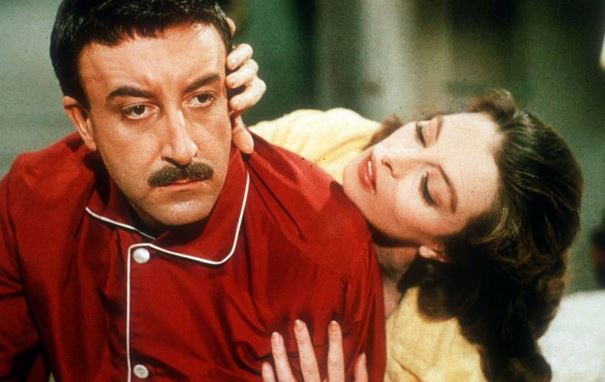Blake Edwards had this odd notion. Movies, he felt, should be fun to make and to watch.
That first always seemed true. “He would fall off his chair laughing,” Lesley Ann Warren told the Television Critics Association.
And the second? Audiences loved most of his Pink Panther movies, shrugged at some of his other films, then buzzed about “10” and “Victor/Victoria.” Edwards received an honorary Academy Award, then was semi-forgotten.
Until now. At 8 p.m. Tuesday (Aug. 27), PBS’ “American Masters” offers a jaunty journey through Edwards’ life.
This was a writer/director known for broad comedies like “The Pink Panther” (show here). But his work was different:
— Early. “I had seen ‘Breakfast at Tiffany’s 11 times” before being cast by Edwards in a film, Warren said. That sweet-spirited Audrey Hepburn film in 1961 was followed by “Days of Wine and Roses,” about alcoholism.
— Late. “All of a sudden, there was a jump forward for Blake in what he was writing and what he was trying to say,” Bo Derek said.
She points to “10” (1979), “Victor/Victoria” (1982) and “Switch” (1991) as films with more-serious themes, and to the 1981 “S.O.B.” That one satirized Hollywood, but Edwards seemed to love most of the movie world.
After his father left, his mother married the son of a silent-movie director. When Edwards was 3, the family moved from Oklahoma to California.
There, his step-father was a movie production manager, partly explaining Edwards’ fondness for crew members. “Most of the people on the set, he’d worked with for 30 years (and were) close friends,” Derek said of “10.”
Edwards had tiny acting roles in movies and TV, before and after being in the wartime Coast Guard. He started writing and directing TV episodes in 1953.
That brought one of his most important connections: Edwards created the “Peter Gunn” detective series and hired young composer Henry Mancini; the jazzy theme song was nominated for an Emmy and two Grammys.
Mancini would soon win Academy Awards for the lush themes for “Breakfast at Tiffany’s” (“Moon River”) and “Days of Wine and Roses.” In all, he scored 30 Edwards films.
And in 1964, a Mancini tune made a movie click instantly. Viewers heard the jaunty theme, as a cartoon creature frolicked through opening credits. “The Pink Panther,” with Peter Sellers and lots of sight gags, was going to be fun.
Edwards linked with Sellers for four more Pink Panther movies plus “The Party.” Add the comedy epic “The Great Race” and he was considered the master of sight gags – despite failed Panther films after Sellers’ death.
By then, Edwards was heading in new directions. “His four-decade marriage to … Julie Andrews shaped his life and career,” said Michael Kantor , the “American Masters” producer..
They married in 1969 and Edwards built ambitious films (“Darling Lili,” “Victor/Victoria”) around her. At work, he remained casual.
“He spoiled me,” Derek said. “I thought that’s what filmmaking was like. You had a strong filmmaker who was relaxed and confident.”
Edwards enjoyed the process, Warren said, but he would quit early. “He believed that people couldn’t be funny after 10 hours of shooting.” So “Victor/Victoria” wrapped at 5 p.m. daily; since this was in England, that was shortly after the 4 p.m. tea trolley.
Edwards struggled with depression, the “Masters” film reveals, especially during mid-life and beyond.
Dudley Moore’s weary “10” character reflected some of that, Derek said. Edwards “did tell me that he was deep into therapy. But I never saw his depressive side. He (had) kind of a wicked grin and a smile and a chuckle.”
Even his casting was casual. Warren didn’t audition; neither did Derek … despire the fact that she had no agent and only two obscure acting roles.
For both women, Edwards’ script specified nudity. Warren followed Andrews’ advice (“just beg him”) and got a reprieve; Derek had no objection.
“I grew up on the beaches of Southern California and you wear a little bikini and … it’s not that different from being nude,” she said. Besides, this “wasn’t a love scene. It was the most important dialog for my character.”
The movie topped the box office, making $75 million in the U.S. and Canada. It made some top-10 lists and dominated pop culture.
Edwards would follow with “S.O.B” and “Victor/Victoria,” then have a decade of lesser films. He directed his last movie at 70, but did more work with Andrews – a short-lived TV series and a thriving, Broadway musical version of “Victor/Victoria.”
He died in 2010 at 88, after providing decades of fun for actors and audiences.

Blake’s films were fun to watch … and to make
Blake Edwards had this odd notion. Movies, he felt, should be fun to make and to watch.
That first always seemed true. “He would fall off his chair laughing,” Lesley Ann Warren told the Television Critics Association.
And the second? Audiences loved most of his Pink Panther movies, shrugged at some of his other films, then buzzed about “10” and “Victor/Victoria.” Edwards received an honorary Academy Award, then was semi-forgotten.
Until now. At 8 p.m. Tuesday (Aug. 27), PBS’ “American Masters” offers a jaunty journey through Edwards’ life.
This was a writer/director known for broad comedies like “The Pink Panther” (show here). But his work was different: Read more…